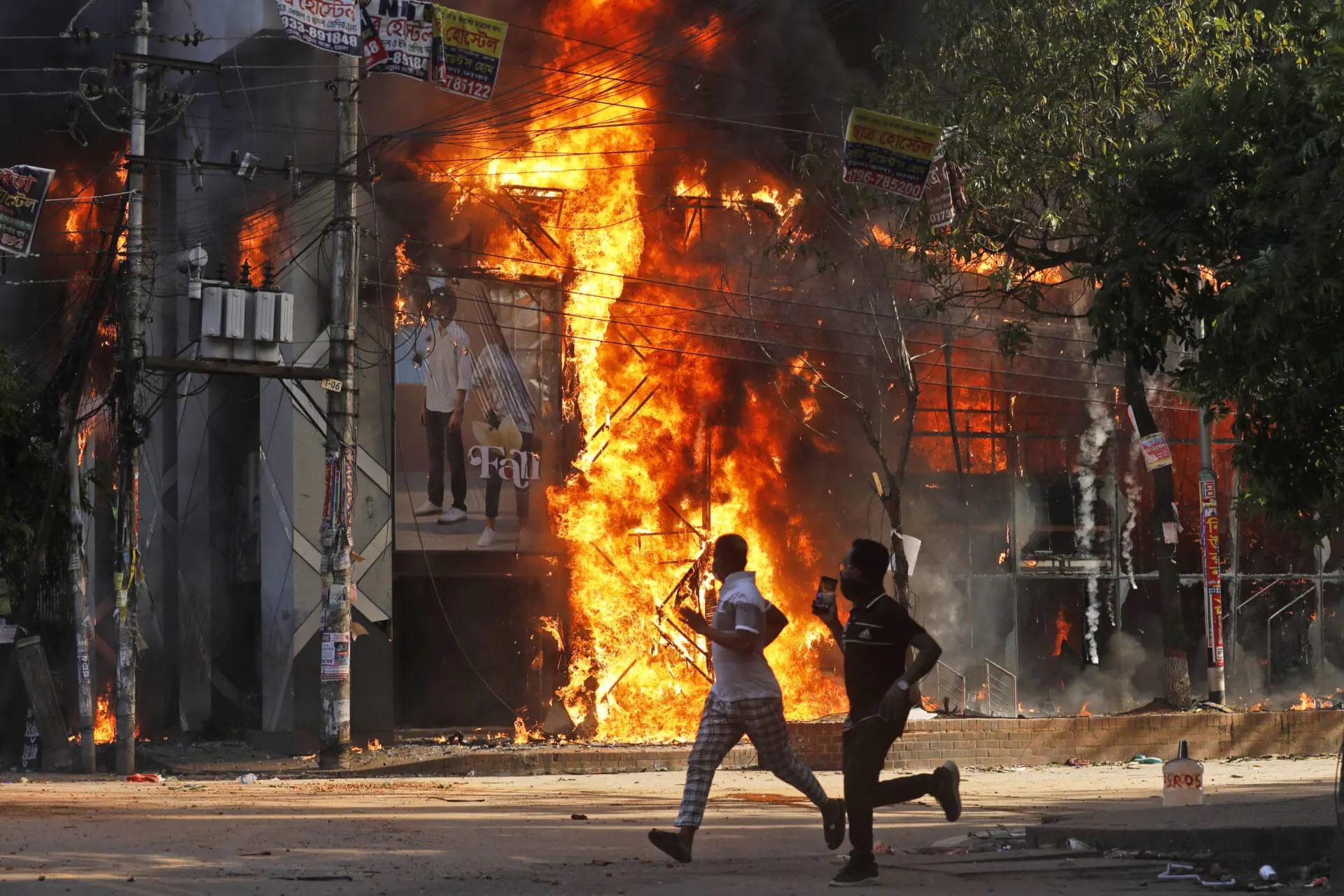Renewed anti-government protests leave nearly 100 dead in Bangladesh
DHAKA, Bangladesh (AP) — Nearly 100 people were killed and hundreds more injured Sunday as renewed anti-government protests swept across Bangladesh, with protesters calling for the prime minister to resign and the prime minister accusing them of “sabotage” and cutting off mobile internet in a bid to quell the unrest.
The country’s leading Bengali-language daily newspaper, Prothom Alo, said at least 95 people, including at least 14 police officers, died in the violence. The Channel 24 news outlet reported at least 85 deaths.
The military announced that a new curfew was in effect Sunday evening for an indefinite period, including in the capital, Dhaka, and other divisional and district headquarters. The government had earlier imposed a curfew with some exceptions in Dhaka and elsewhere.
Demonstrators are demanding Prime Minister Sheikh Hasina’s resignation following protests last month that began with students calling for an end to a quota system for government jobs. Those demonstrations escalated into violence that left more than 200 dead.
As the renewed violence raged, Hasina said the protesters who engaged in “sabotage” and destruction were no longer students but criminals, and she said the people should deal with them with iron hands.
The ruling Awami League party said the demand for Hasina’s resignation showed that the protests have been taken over by the main opposition Bangladesh Nationalist Party and the now-banned Jamaat-e-Islami party.
Also Sunday, the government announced a holiday from Monday to Wednesday. Courts were to be closed indefinitely. Mobile internet service was cut off, and Facebook and messaging apps, including WhatsApp, were inaccessible.
Junior Minister for Information and Broadcasting Mohammad Ali Arafat said the services were severed to help prevent violence.
At least 11,000 people have been arrested in recent weeks. The unrest has also resulted in the closure of schools and universities across the country, and authorities at one point imposed a shoot-on-sight curfew.
Protesters called for a “non-cooperation” effort, urging people not to pay taxes or utility bills and not to show up for work on Sunday, a working day in Bangladesh. Offices, banks and factories opened, but commuters in Dhaka and other cities faced challenges getting to their jobs.
The demonstrators attacked Bangabandhu Sheikh Mujib Medical University, a major public hospital in Dhaka’s Shahbagh area, torching several vehicles.
Video footage showed protesters vandalizing a prison van in the chief metropolitan magistrate’s court in Dhaka. Other videos showed police opening fire on the crowds with bullets, rubber bullets and tear gas. The protesters set fire to vehicles and the ruling party’s offices. Some carried sharp weapons and sticks, according to TV footage.
In Dhaka’s Uttara neighborhood, police fired tear gas to disperse hundreds of people who blocked a major highway. Protesters attacked homes and vandalized a community welfare office in the area, where hundreds of ruling party activists took up positions. Some crude bombs were detonated, and gunshots were heard, witnesses said. At east 20 people were hit by bullets in the area.
At least 18 people were killed in the northwestern district of Sirajganj. That figure included 13 police officers who died after a police station was attacked by protesters, according to police headquarters in Dhaka. Another officer was killed in the eastern district of Cumilla, police said.
Five people died in the Feni district in southeast Bangladesh as Hasina’s supporters clashed with protesters.
Asif Iqbal, a resident medical officer at a state-run hospital in Feni, told reporters that they had five bodies at the hospital, all of them hit by bullets. It was not clear if they were protesters or ruling party activists.
In Munshiganj district near Dhaka, four people were declared dead after being rushed to a hospital, according to hospital official Abu Hena.
The Jamuna television news channel reported that violent clashes took place across more than a dozen districts, including Chattogram, Bogura, Magura, Rangpur, Kishoreganj and Sirajganj, where protesters backed by the main opposition party clashed with police and the activists of the ruling Awami League party and its associated bodies.
The protests began last month as students demanded an end to a quota system that reserved 30% of government jobs for the families of veterans who fought in Bangladesh’s war of independence against Pakistan in 1971.
As the violence crested, the country’s Supreme Court ruled that the veterans’ quota must be cut to 5%, with 93% of jobs to be allocated on merit. The remaining 2% will be set aside for members of ethnic minorities and transgender and disabled people. The government accepted the decision, but protesters have continued demanding accountability for the violence they blame on the government’s use of force.
The system also sets aside jobs for members of ethnic minorities and for disabled and transgender people, whose quotas were cut from a collective 26% to 2% in the ruling.
Hasina’s administration has blamed the opposition parties and their student wings for instigating the violence in which several state-owned establishments were also torched or vandalized.
Mirza Fakhrul Islam Alamgir, secretary-general of the main opposition party, repeated a call for the government to step down to stop the chaos.
Hasina offered to talk with student leaders on Saturday, but a coordinator refused and announced a one-point demand for her resignation.
Hasina repeated her pledges to investigate the deaths and punish those responsible for the violence. She said she was ready to sit down whenever the protesters want.
The protests have become a major challenge for Hasina, who has ruled the country for over 15 years. She returned to power for a fourth consecutive term in January in an election that was boycotted by her main opponents.
